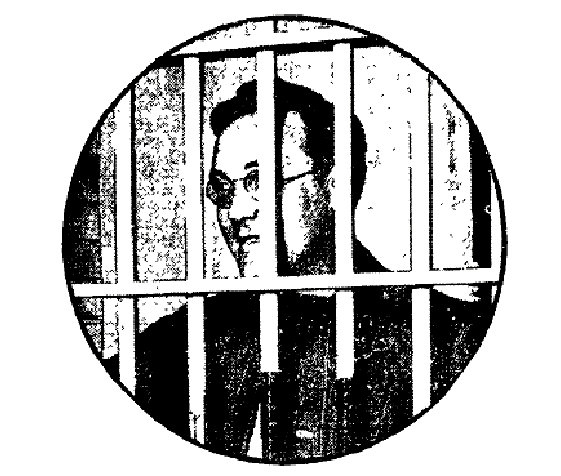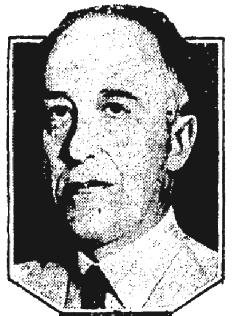Tuesday, July 26, 2005
Page 7
PERSPECTIVES (Column)
County Bar of 1930s Advocates Contempt Jailings for Commenting on Court Proceedings
By ROGER M. GRACE
Back in the 1930s, the County Bar was fervent in its belief that any comment on a pending case was an affront to the judicial process, and saw a contempt jailing as the appropriate remedy. It obtained the incarceration of a popular radio evangelist, went after editorial personnel at a Los Angeles daily newspaper, and even sought the punishment of union members for protesting a judge’s decision.
In its zeal to protect the judicial process from outside influence, it somehow blinded itself to First Amendment considerations.
•Contempt proceedings were brought against the Rev. Robert P. “Fighting Bob” Shuler, pastor of the Trinity Methodist Episcopal Church South. Shuler broadcast sermons and political commentary over his church’s radio station, KGEF. (But don’t confuse him with TV preacher Robert H. Schuller of Garden Grove’s Crystal Cathedral who went on the air many years later, and is still broadcasting.)
An article in April, 1931 in EveryWeek Magazine, a national Sunday supplement, said of Shuler:
“That he is an important figure in the affairs of running the city cannot be denied. The amount of space he gets in the newspapers is rivaled only by that of the woman evangelist, Aimee Semple McPherson, and the movie actress, Clara Bow.”
Shuler in 1930 aired comments on proceedings in the trial of two persons charged with bribing Asa Keyes while he was district attorney. One of the defendants, Jack Bennett, had been a principal in Julian Petroleum Corporation which had engaged in stock fraud, fleecing at least 40,000 investors. The other defendant was Ben Getzoff, an associate of Keyes known as a “fixer.” Executives of Julian Petroleum had been acquitted in 1928 of criminal charges in connection with the fraud, with the trial judge attributing the jury’s verdict to a lack of “diligence” on the part of Keyes in conducting the prosecution. It later emerged that Keyes had held back, having been bribed. Bennett and Getzoff were on trial for that bribery in the courtroom of Los Angeles Superior Court Judge Marshall F. McComb (later a justice of the California Supreme Court). Shuler blasted some of McComb’s rulings. He also commented on impending cases.
The Los Angeles Bar Association went into action. Numerous affidavits were executed by members in support of contempt charges.
On May 5, 1930, Los Angeles Superior Court Judge Clair S. Tappaan sentenced Shuler to five days in jail on each of four counts. After 15 days behind bars, Shuler was released on bail on orders of the California Supreme Court, which proceeded to consider his petition for a writ of habeas corpus.

SHULER
In a per curiam opinion issued Oct. 1, 1930, the high court granted the petition on the ground that one of the counts related to comments on proceedings in a case that had been concluded. (In re Shuler, 210 Cal. 377.) Five days having been served on each of three counts, the court said, Shuler was entitled to remain free.
Broad language in the opinion as to a court’s power to find a person in contempt for speaking or writing on matters still pending was disturbing. But the posture of the law was to change by virtue of a decision of the U.S. Supreme Court, to be discussed in my next column. That decision was prompted by the Los Angeles Bar Association’s quest for contempt adjudications.
•The County Bar also caused contempt proceedings to be instituted in 1930 (during the time Shuler was in jail) against the publisher, editor, and managing editor of the Los Angeles Record. The newspaper had published editorials and cartoons slamming the grand jury and the new district attorney for laxity in the investigation of the Julian Petroleum stock scandal.
On May 20, 1930, The Associated Press carried this report:
William G. McAdoo, former secretary of the treasury, has been retained by the Los Angeles Evening Record to fight the contempt of court charges brought by the Los Angeles Bar association. Mr. McAdoo today made public the following statement:
“The fundamental issue in the contempt proceedings against the editors and publisher of the Los Angeles Record is liberty of speech and of the press. The California constitution explicitly prohibits the enactment of any law that will restrain or abridge this liberty. Since the legislature is powerless to do it, a tendency has developed recently to accomplish, through contempt proceedings, restraint of that very liberty in violation of these constitutional guarantees. Liberty will be a mere shadow if, through administrative tyranny or any form of censorship, the right to freely speak, write and publish opinion shall be compromised or denied. The issue in this case therefore transcends petty political considerations, the promptings of expediency of personal ambitions and must be fought to conclusion.”
In an editorial on May 26, The Helena (Mont.) Independent took up the cause of the Los Angeles newspaper—and lambasted the County Bar. Under the heading, “The Height of Legal Impudence,” it said:
Every bar association, every honest lawyer, should be quick to condemn the impudent attempt of a clique in the Los Angeles Bar association to dictate the course of justice in southern California.
This clique, for years, has tried to dominate the legal system of its bailiwick. It was caught, recently, accepting a check from S. C. Lewis, one of the wreckers of Julian Petroleum, for the purpose of influencing judicial campaigns in Los Angeles.
The catching was done by The Los Angeles Record, which reproduced the Lewis check on its pages.
The same bar association now has the unmitigated impudence to accuse three working newspapermen of trying to influence the course of justice!
The association clique, in other words, is quite ready to accept money to elect judges, but stands aghast when an honest newspaper, through its columns, dares to suggest that justice to 40,000 stockholders in a callously wrecked corporation is not being done.
Publisher [H.B.R] Briggs of The Record, cited by this clique to show cause why he should not be adjudged in contempt of court for telling the truth, says that this is a free speech fight. He is right.
The people, through their newspapers, have the broadest rights of criticism of their courts They own the courts; they run them.
Lawyers are mere go-betweens, agents and middlemen. Their services are for sale to the bidder. Their assumption to speak for courts is grotesque, especially in view of the general belief that most of the thwarting of justice in this nation is the result of legal jugglery and chicanery.
The essential fact in the Los Angeles fight is not that any court is in danger of losing its dignity, but that a legal clique—for reasons best known to itself—is seeking to crush a newspaper that is telling healthy truths about a swindle that robbed 40,000 westerners of $50,000,000.
On June 2, the defendants appeared in the courtroom of Superior Court Judge Frank J. Collier and presented a challenge for cause. The primary allegation was that Collier, a member of the County Bar, had given advice to its Board of Trustees that contempt charges would lie based on the commentary in the Los Angeles Record. Declaring that the disqualification statute, Code of Civil Procedure §170, did not pertain to constructive contempt proceedings, the judge had himself sworn as a witness, declared the allegations to be false, and found the challenge to be lacking in merit. He continued the matter to allow defense lawyers the opportunity to seek a writ of prohibition in the California Supreme Court—which they did.
On Feb. 25, 1931, the Supreme Court held in Briggs v. Superior Court, 211 Cal. 619, that the disqualification section did apply to constructive contempt proceedings, and that Collier could not pass upon the issue of his own disqualification.
Another Superior Court judge examined the matter and ruled that Collier was not disqualified. That determination sparked another writ petition in the Supreme Court seeking to block Collier from proceeding. The writ was granted on April 29, 1932, in Briggs v. Superior Court, 215 Cal. 336.

BRIGGS
The opinion noted that the affidavit had been supplemented with allegations as to Collier’s conduct on June 2, 1930 in testifying. With respect to the charge that he had given advice to the County Bar, Collier was quoted as saying it was “absolutely and unqualifiedly and wholly false—not one word of truth in it,” adding:
“And the falsity of that statement could have easily been ascertained upon inquiry of me or of any member of the Los Angeles Bar Association.”
He went on to say:
“That statement is a falsehood—every word of it; every word of it….I challenge anyone here to prove that statement….Now any attempt on the part of the drawer of this document or the person who verified it to state that I advised with the Los Angeles Bar Association or any of its Board of Trustees or members with regard to this proceeding is an absolute, unqualified falsehood, and could have been ascertained, if the drawer of this document, or its verifier, had made an investigation of any kind concerning it.”
He likewise denounced other allegations.
The high court said:
“The statements made by Judge Collier and his conduct on the bench may reasonably be interpreted to mean but one thing, namely, that Judge Collier believed that these petitioners had deliberately misstated the truth in their affidavit, and that he charged them with having done so. Under these circumstances is it fair to Judge Collier or to the petitioners that he should be called upon to preside at the trial of the case? We think it would be fair to neither party.”
The contempt matter apparently died.
•Union members, also, were targets of the County Bar’s contempt-a-thon.
Two of them allegedly sent telegrams to a Los Angeles Superior Court judge, Ruben S. Schmidt, protesting his decision in a labor case. Schmidt showed the communiqués to a committee of the County Bar, which filed affidavits in support of contempt charges.
In separate cases, Schmidt found the purported correspondents in contempt.
With respect to German Bulcke, vice president of the International Longshoreman’s union, he spurned both a peremptory challenge and a challenge for cause, and in the case of V. Wahlenmaier, he ignored a challenge for cause. The disqualification statutes were inapplicable, he held, because the contempt was direct, and could be punished summarily.
Justice Douglas Edmonds said in his opinion in Bulcke v. Superior Court, 14 Cal.2d 510:
“The power of a court to punish for a direct contempt is based upon the judge’s knowledge of the commission of the act by the contemnor. A judge usually cannot say with any certainty that a letter or telegram received by him purporting to be signed by a certain person was either written or sent by that person; hence such an act, if contumacious, should be classified as an indirect contempt.”
The contempt judgment was annulled in that case, as in Wahlenmaier’s case, reported at 14 Cal.2d 799.
•The Los Angeles Times and a powerful labor leader also were adjudged in contempt based on their public comments concerning court proceedings. It was the County Bar that instigated the actions against them.
That’s where I’ll pick up next time.
Copyright 2005, Metropolitan News Company